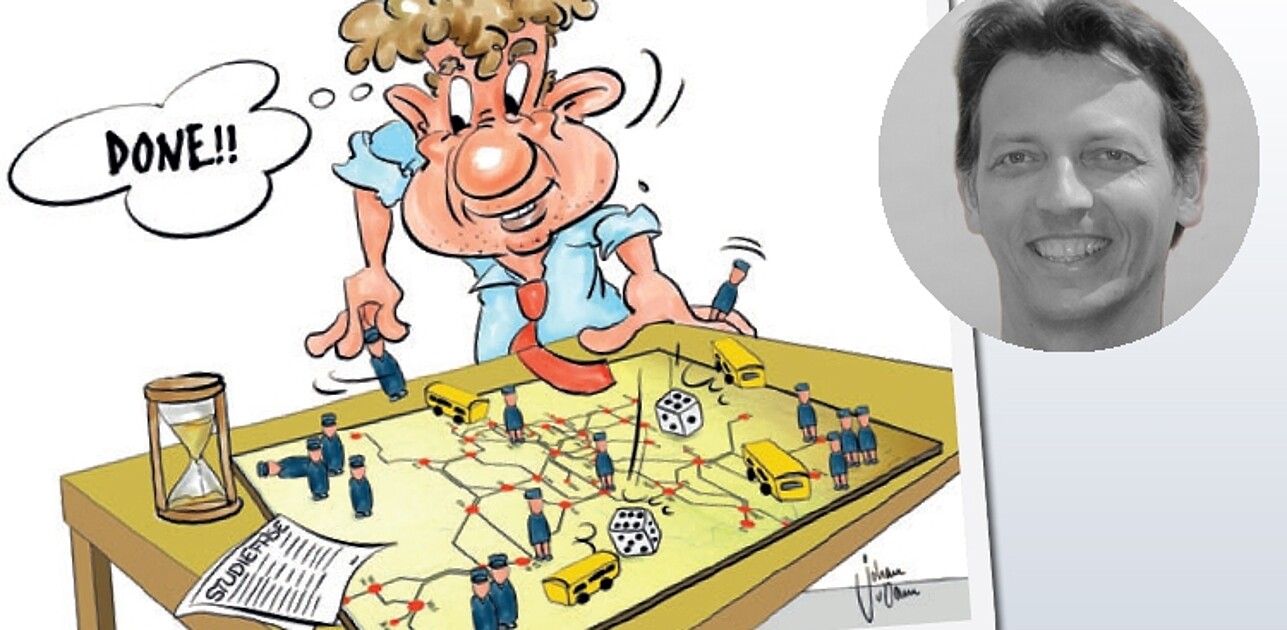

Article: Tuesday, 21 October 2014
How can smart algorithms help restore rail services for travellers? Why isn’t it effective just to have a simplified train schedule with a limited number of routes? And how does smart maths contribute to increased job satisfaction among railway personnel? In his thesis Crew Management in Passenger Rail Transport PhD candidate Erwin Abbink from Rotterdam School of Management, Erasmus University (RSM) demonstrates how advanced mathematics helps the Dutch railway company Nederlandse Spoorwegen (NS) to create a better timetable, even when there are disruptions to rail services.
The NS performs approximately 23,000 tasks every day, from providing a single train journey to checking tickets on a particular route. Drafting a timetable for all these tasks requires many factors to be taken into account, concerned with health and safety, shift work, a diversified work roster and a fair distribution of routes, especially where some have higher incidences of aggression from passengers. After rail unions opposed the introduction of repetitive and simplified train routes, the company adopted the use of algorithms optimised by Abbink instead, and these are discussed in his thesis.
Abbink’s algorithms are not only used by NS; they have also been implemented by other rail companies such as London Underground and the state-run Danish railways DSB. The methods are also finding new applications in rail transport.
These new mathematical methods make it possible to plan personnel services for ticket collectors and engineers in terms of hours instead of months, as was previously the case. Mathematical techniques are also increasingly used for rapid adjustments to the rail timetable during wintry weather, or for quick redeployment of train personnel in the event of disruption, allowing trains to move more efficiently and giving employees more job satisfaction. At the same time there are fewer cancellations, which results in a better service for passengers.
The deployment of drivers and conductors on trains in NS is essential for delivering services to travellers, and forms a large part of the company's costs. In his thesis, Abbink presents various models and algorithms to support the planning and adjustment of such mobile workers. He also gives a more managerial consideration of the related change process and lessons learned from the introduction of these systems into practice.
Their introduction has resulted in a more stable and satisfying relationship between NS and its staff. In addition, planning is a quicker process, taking just a few hours, and the analysis of scenarios has saved a lot of time for the company by making it possible to adjust employment contracts.
As a result of the algorithms, Abbink can also quickly customise rail services; for example if wintry conditions are expected. Finally, it is now also possible to adjust staffing on the day using advanced decision support systems meaning fewer delays and cancelled trains and greater adaptability.
Abbink has defended his thesis in the Erasmus University Rotterdam Senate Hall on Friday, 24 October 2014. His thesis promotors are Prof. Leo Kroon and Prof. Albert Wagelmans, and his co-supervisor is Dr Dennis Huisman. Other members of the doctoral committee are Prof. Will Bertrand (Eindhoven University of Technology), Prof G. T. Timmer (VU University Amsterdam) and Prof Erik van Heck from RSM.


Science Communication and Media Officer

Corporate Communications & PR Manager
Rotterdam School of Management, Erasmus University (RSM) is one of Europe’s top-ranked business schools. RSM provides ground-breaking research and education furthering excellence in all aspects of management and is based in the international port city of Rotterdam – a vital nexus of business, logistics and trade. RSM’s primary focus is on developing business leaders with international careers who can become a force for positive change by carrying their innovative mindset into a sustainable future. Our first-class range of bachelor, master, MBA, PhD and executive programmes encourage them to become to become critical, creative, caring and collaborative thinkers and doers.
